Hundreds of migrants stuck at a Budapest railway station for days have set off on foot, saying they intend to walk to Austria.
Hungarian authorities are trying to contain thousands of people desperate to reach western Europe.
Meanwhile European Union states are struggling to agree a common strategy to deal with the crisis.
The head of the UN refugee agency said EU nations must mobilise “full force” and accept up to 200,000 refugees.
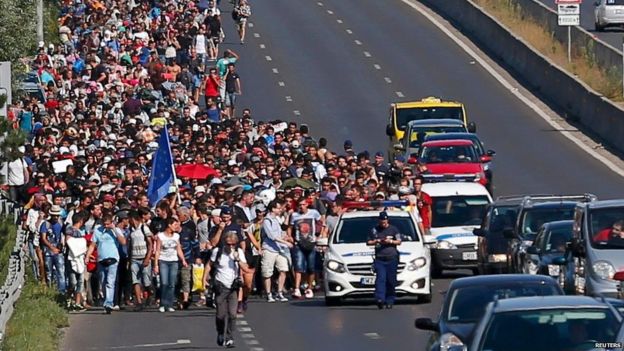
Hundreds of migrants walked along the motorway heading out of Budapest to the west
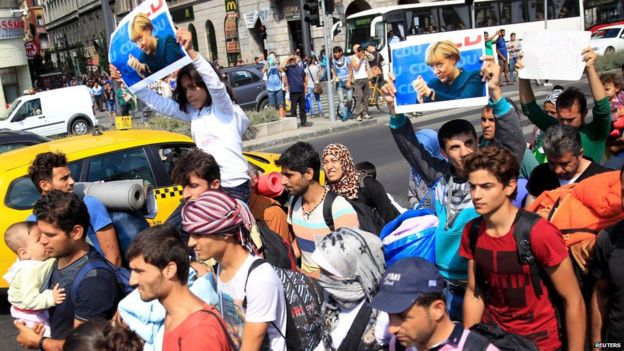
The chaotic scenes in Hungary – a main transit country for migrants seeking to claim asylum in Germany and other countries in north and west Europe – have continued for another day:
- Migrants who had been waiting days at Budapest’s Keleti station have left and plan to walk to Vienna, in the absence of trains, a journey of 240km (150 miles)
- A stand-off between police and passengers on a train held at Bicske station continues, as the people on board are refusing to go to a transit camp to be processed. Riot police have been seen entering the station, and there are reports that a large group of migrants have escaped from the train
- Hundreds of people have broken out of a refugee camp at Roszke near the Serbian border and are being pursued by police; thousands more still inside are threatening to break out too
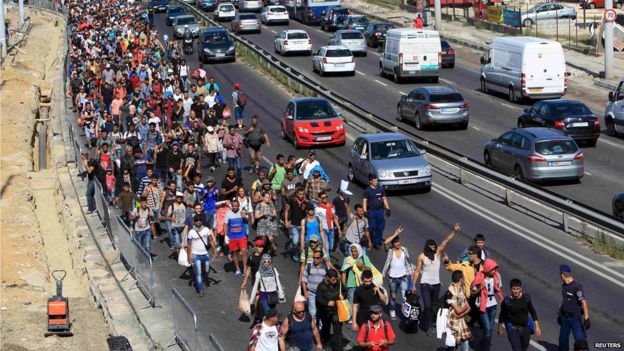
Large crowds of people could be seen walking through Budapest
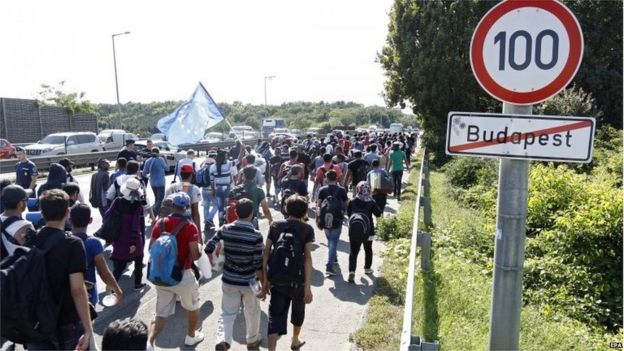
This group of migrants waved an EU flag as they crossed the Budapest city limits
Antonio Guterres, head of the UN refugee agency, the UNHCR, said the crisis was a defining moment for Europe.
In a statement, he said Europe needed to build “adequate reception capacities”, especially in Greece, replacing a “piecemeal” approach with a “common strategy”.
In other developments:
- The UK government – under pressure over its response to the crisis – has agreed to provide settlement for “thousands more” Syrian refugees and an extra £100m in aid for Syrians in the Middle East
- Hungarian MPs have approved tougher border controls and penalties for migrants trying to pass through to Germany
- Members of the European Commission are in the Greek island of Kos to examine the difficulties caused by the large numbers of refugees and migrants landing there
- The leaders of Poland, the Czech Republic, Slovakia and Hungary are holding an extraordinary summit in Prague
- EU foreign ministers are meeting in Brussels
- Some 50 migrants are feared to have drowned after their boat sank off the coast of Libya, according to the International Organization for Migration
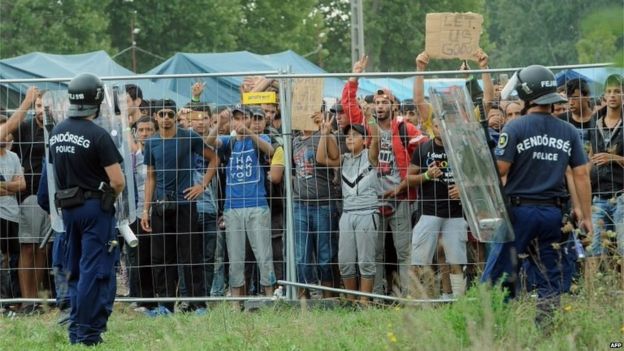
A group of around 300 migrants escaped from this camp at Roszke, near Hungary’s border with Serbia
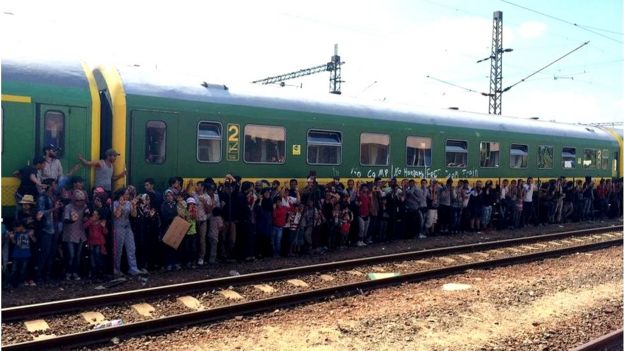
The migrants on the train at Bicske since Thursday are refusing to go to the nearby refugee camp
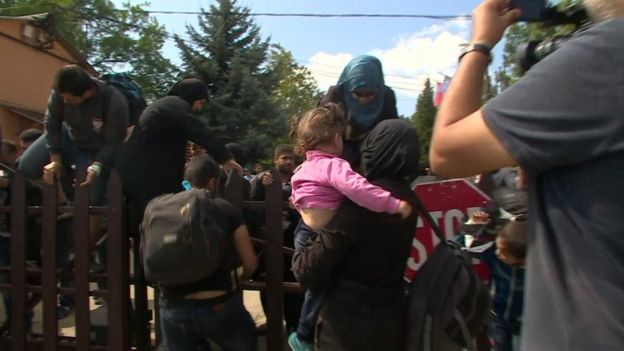
These migrants climbed over the gates to get out of a transit camp at Bicske
Migrant crisis: coverage in detail
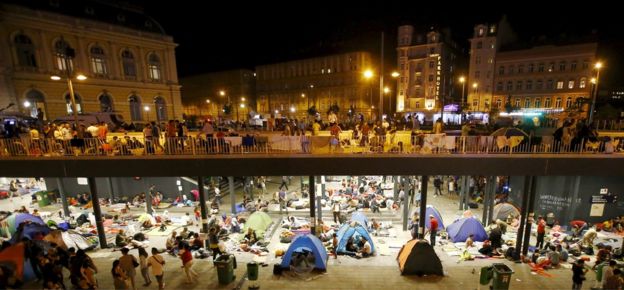
Hungary lays bare EU East-West split
Will one image change our views?
Migrant crisis: Key questions
Why is there a refugee crisis?
EU countries are under pressure as a surge of migrants from the Middle East and Africa seek to escape war and oppression. Italy, Greece and Hungary, on the the EU’s borders, are under particular pressure.
Where are the refugees coming from?
Syrians make up the largest group by nationality, followed by Afghans and Eritreans.
Why are people fleeing Syria?
An uprising against President Bashar al-Assad erupted in March 2011, since when the country has since descended into a complex civil war. More than 240,000 people have been killed, and around half Syria’s pre-war population have fled their homes.
Why is EU struggling with migrants and asylum?
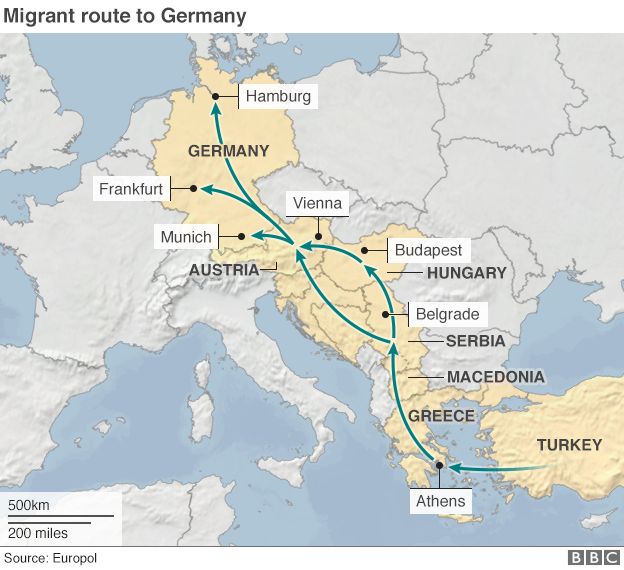
BBC
 Q FM Africa's Modern Radio
Q FM Africa's Modern Radio